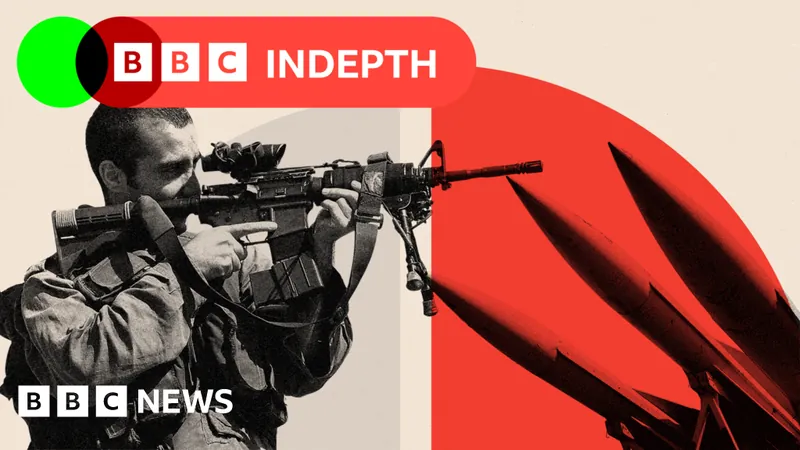
Escalation in the Middle East: Perspectives from Experts on What Comes Next
2024-10-04
Escalation in the Middle East: Perspectives from Experts on What Comes Next
As tensions soar in the Middle East, experts weigh in on the potential fallout and future implications of ongoing conflicts. The situation remains extremely volatile following Israel's ground invasion of southern Lebanon on October 1, coinciding with Iran's missile strike, which saw over 180 missiles launched toward Israeli territory. With clashes in Gaza still unfolding, apprehensions about an all-out regional war are mounting.
Israel’s Strategic Shift in Lebanon
Israel's military objectives in Lebanon have seemingly evolved from simply depleting Hezbollah's power to a more ambitious goal of permanently neutralizing the group. Despite inflicting substantial losses, experts note that the Israeli military's efforts may not guarantee the complete eradication of Hezbollah. The Israeli government's dual rhetoric of protecting its northern territories while facing potentially expansionist forces complicates the landscape. The delicate balance rests on whether the Lebanese government can reassert control over Hezbollah, reminiscent of the consequences faced during Israel's 1982 invasion aimed at the Palestinian Liberation Organization.
Redrawing the Middle Eastern Power Map?
The balance of power in the Middle East is gradually shifting, though experts caution that any significant changes will require time and considerable diplomatic maneuvering. The long-standing stalemate between Iran, its proxies such as Hamas and Hezbollah, and Israel was disrupted after significant aggression on October 7. While Israel has seen tactical gains, translating these into strategic advantages remains uncertain.
Iran's Nuclear Ambitions Come into Focus
Iran's capacity to wield Hamas and Hezbollah as proxies is now called into question, leading some inside the Iranian establishment to consider advancing its nuclear weapons program. Yet, should Iran embark on developing such capabilities, it would open a Pandora's box, especially given the disparity between its conventional forces and those of Israel. The Iranian leadership's historical animosity towards Israel continues to complicate matters, though pragmatic voices within Iran advocate for non-involvement in foreign conflicts.
Impact on the Gaza Conflict
The expansion of Israeli military operations has the potential to inflame public sentiment across Arab nations in favor of the Palestinian cause, complicating prospects for peace. The lack of a coherent political strategy for post-conflict governance in Gaza poses a significant challenge for Israel. While military pressure has imperiled Hamas, Israel's failure to establish a political framework that fosters Palestinian self-determination threatens to perpetuate instability.
The U.S. Influence in the Conflict
The upcoming U.S. election could pivot the dynamics of foreign policy, but historical patterns suggest that any American president's ability to significantly sway Israeli military operations is contingent upon domestic political considerations. The $10 billion in support for Israel's military endeavors gives America leverage, yet the willingness of U.S. politicians to utilize this leverage effectively remains in question—with no clear leaders in sight who might emulate past figures like Ronald Reagan or George H.W. Bush.
Paths to De-escalation: Can Peace Be Achieved?
Amid growing conflict, avenues for de-escalation seem increasingly elusive. The Israeli government, buoyed by perceived momentum on the battlefield, may reject peace overtures. Nevertheless, diplomacy is recognized as the only sustainable path toward stability. Potential off-ramps include a ceasefire in Gaza that fosters Palestinian governance chosen by its people or a truce in Lebanon linked to reduced Hezbollah attacks in exchange for a halt to Israeli airstrikes.
In summary, while current events suggest a mounting crisis, the efficacy of military solutions will ultimately be tested against diplomatic engagement. Without a guided political resolution, the ongoing conflicts will likely exacerbate regional tensions rather than lead to enduring peace. As experts indicate, the path beyond military action must be paved with a comprehensive political strategy that acknowledges the complex social and historical factors at play in this troubled region.




 Brasil (PT)
Brasil (PT)
 Canada (EN)
Canada (EN)
 Chile (ES)
Chile (ES)
 España (ES)
España (ES)
 France (FR)
France (FR)
 Hong Kong (EN)
Hong Kong (EN)
 Italia (IT)
Italia (IT)
 日本 (JA)
日本 (JA)
 Magyarország (HU)
Magyarország (HU)
 Norge (NO)
Norge (NO)
 Polska (PL)
Polska (PL)
 Schweiz (DE)
Schweiz (DE)
 Singapore (EN)
Singapore (EN)
 Sverige (SV)
Sverige (SV)
 Suomi (FI)
Suomi (FI)
 Türkiye (TR)
Türkiye (TR)